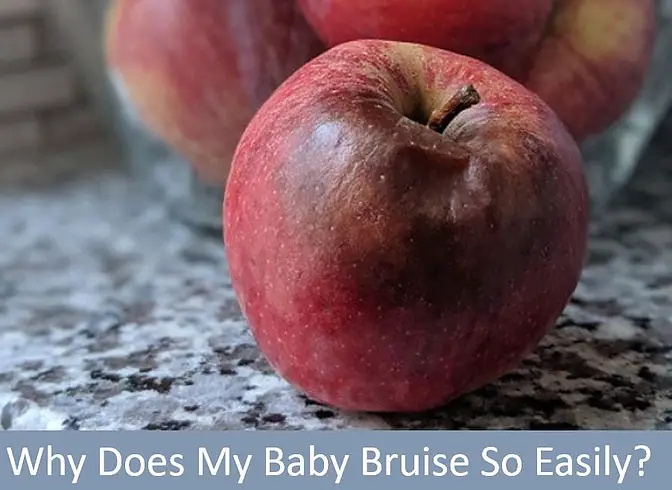Why Does My Baby Bruise So Easily? (7 Reasons Why)

Children’s bodies are adorned with bruises, scratches, and bumps from their everyday activities. This isn’t the case for babies.
Bruises are rare in babies, especially those who aren’t yet moving.
Yet they happen.
What causes them to happen? And why does my baby seem to bruise so easily?
Let’s find out 7 reasons why your baby may bruise.
Why Does My Baby Bruise So Easily?
There are several reasons why babies bruise easily. One of the reasons is this trait can be inherited. The condition may also be caused by blood-thinning drugs, steroids or some over-the-counter supplements. There is also a rare possibility that your baby may suffer from a blood disorder, such as haemophilia, low blood platelets, von Willebrand disease or leukaemia. And finally, bruising can also be caused by vitamin C, K, B12 deficiency or physical trauma.
Bruising: Introduction
A bruise is a skin discolouration that appears because of skin trauma.
Consequently, capillaries (tiny blood vessels) break when the skin is injured, causing a small amount of blood to be released under the skin.
During the healing process, bruising changes colour. The colour progression starts with red, moves to purple, then to black, and then to blue, green, and yellow.
This is a normal, healthy response to an injury and indicates that the body is recovering. And it can take around 2 weeks for the body to reabsorb all the trapped blood and complete the healing process.
However, there are some other signs to look out for that may require medical attention.
So, When Should I Worry About My Baby’s Bruises?
- If your baby has bruises but isn’t crawling or walking yet,
- When your baby has bruises for no apparent reason,
- If the bruise doesn’t heal within two weeks,
- If the swelling or a lump is present in the bruising area,
- The bruise is proportionately more severe than the injury itself.
When to Worry About Bumps & Bruises – On Call for All Kids
Now, babies will bruise a lot easier than adults. The reason is that their skin is more delicate and thinner, so blood vessels have less protection from getting damaged. Furthermore, the bruise will be more visible under their thin skin too.
Some babies are more prone to bruising than others. And the healing process might be longer for them as well.
However, all of that would depend on what caused the bruise in the first place.
Here are some of the most common causes of bruising in babies.
1. Family History of Easy Bruising
A tendency to bruise and bleed easily can be inherited from other family members.
Therefore, you should check if any of your or your partner’s family members have similar problems.
You should also keep in mind that senior citizens bruise easily also, just in case the grannies raise the issue!
The reason is that ageing skin and tissue supporting blood vessels become thinner, more sensitive, and fragile (just like babies). Therefore, their blood vessels can be easily raptured and cause discolouration.
2. Taking blood thinners medication
Blood thinners are a group of drugs that effectively prevent blood clots from forming.
They affect how platelet function and may increase the risk of bleeding. This is a bit of a problem since platelets are responsible for clotting and preventing bruises and bleeding.
Aspirin, ibuprofen, antibiotics, and other anticoagulant and antiplatelet medications are blood thinners, so it may explain why your baby bruises and bleeds more easily.
3. Taking steroids for Eczema, Psoriasis, or Dermatitis
Another type of medication that may prompt easy bruising is topical steroids.
Doctors usually prescribe these to treat skin conditions such as eczema, contact dermatitis, or psoriasis.
And if your baby has been using steroids for a long time, then bruising, skin discolouration or spidery blood vessels are common side effects. That’s because steroids cause the skin to become thin and blood vessels to become more prone to breakage and bleeding.
Also, it is worth adding that sometimes the long-term steroid treatment may lead to the development of Cushing syndrome.
This is a rare condition, especially in babies. It is caused by exposure to excessive amounts of synthetic cortisol from steroid tablets.
Sometimes it can also be caused by a tumour.
The typical symptoms of Cushing syndrome in babies include rapid weight gain, especially in the face and neck – but thin arms and legs, slow growth rate, stretch marks on the abdomen, thighs and buttocks, high blood pressure, and high sugar level.
So, if your baby who is on steroid treatment experiences these symptoms, you should see a doctor for advice.
(And please don’t stop the steroid treatment for your baby without consulting a doctor).
4. Taking Over-The-Counter Supplements
In fact, over-the-counter supplements like fish oil, garlic, Ginkgo Biloba, and vitamin E can cause bruising in your baby.
These supplements may alter the normal function of platelets, preventing them from clotting.
Therefore, you should always consult your baby’s doctor before taking any new supplements.
5. Blood Clotting Disorders
Several medical disorders can cause abnormally low levels of clotting factors and platelets. These abnormalities result in a tendency to bruise and bleed easily. Amongst the most common conditions are:
5.1 Haemophilia & Low Blood Platelet Count (Thrombocytopenia)
I have already covered these two conditions in detail in my post Why Won’t My Baby’s Finger Stop Bleeding.
So, if you haven’t already, check it out, as there is no point in repeating it here.
5.2 Von Willebrand disease
Von Willebrand disease – is a relatively common and mild genetic disorder.
This disease develops in babies with a low concentration of von Willebrand clotting factor in their blood, or the clotting factor doesn’t work as it was supposed to.
This factor helps blood clot during bleeding. It results in easy bruising, easy bleeding, and long-lasting bleeding, especially on the nose and gums.
This illness cannot be cured, but minor lifestyle changes and medications can help manage it.
5.3 Leukaemia
Acute lymphoblastic leukaemia is a rare condition, albeit the most common childhood cancer.
It affects the production of white blood cells. So, what happens is that the white blood cells are released into the blood before they are fully matured. And as they continue to reproduce on a large scale, they outnumber the healthy red cells and platelets.
The development of leukaemia is caused by a DNA mutation in the stem cells produced by the bone marrow.
The first symptom of leukaemia is the development of anaemia.
So, the baby may be overtired even after a good rest, have pale skin, or experience breathlessness.
Other typical symptoms include frequent and prolonged infections.
That’s because the underdeveloped white cells cannot fight bacteria and viruses effectively. The lack of healthy blood cells may also cause a tendency to bruise, frequent nosebleeds or gum bleeds, bone and joint pain, and swollen lymph glands.
Diagnosing leukaemia usually involves taking a sample of bone marrow to screen for cancerous cells. With early diagnosis and the appropriate treatment, the baby has a good chance of a full recovery.
Symptoms of the disease are usually mild and start slowly. As the underdeveloped white cells grow, the disease progresses more aggressively.
The symptoms of many of these conditions are also common to other conditions that affect babies.
So, if your child shows these symptoms, it doesn’t necessarily mean she has leukaemia.
But if you are concerned your baby may have it, you should always take your child to the doctor for a diagnosis.
6. Vitamin C or K, B12, Folic Acid Deficiency
It is yet another possible explanation for bruises in babies, albeit it is unlikely to occur. This is especially true if your baby had vitamin K shots after birth.
It is difficult for a healthy baby who eats a well-balanced and healthy diet to develop vitamin deficiency.
It is, however, possible if your baby suffers from a condition that prevents absorption of nutrients, such as chronic diarrhoea, or who is on a long course of antibiotic treatment.
Nevertheless, this condition is relatively easy to diagnose with a blood test and reasonably easy to correct by taking the appropriate supplement.
7. Bruising As A Result Of Falls Or Injury
They are rare though, especially in babies who are not mobile.
But babies tend to be fidgety, and accidents often happen.
Baby bruises are most commonly caused by falling off of the bed.
Although it usually doesn’t cause serious harm, you should quickly assess the situation for a more severe head injury, bleeding, vomiting, or loss of consciousness. These are severe symptoms, so you should seek medical help immediately.
Now, if your little one experiences unexplained bruises and they appear in less expected places like buttocks, upper legs, face, ears, upper arms – this may be a sign of intentional injury.
Although it may sound frightening, it is something to consider and hopefully rule out.
Final Few Lines
There you have it. 7 possible reasons why your little one’s body may bruise easily.
If you want to find out what causes your baby’s bruises, a detailed blood test should bring you closer to an answer.
And finally, be prepared. Once your baby starts crawling, pulling to stand, and moving around, bruising will become a part of their life. Especially if it appears on their shins, forehead, lower legs, and arms.
And unless you decide to wrap your tot in bubble wrap, there is not much you can do to prevent it.
However, if you suspect that your child has unusual bruises, do not hesitate to consult your doctor for an assessment and rule out any underlying conditions.

